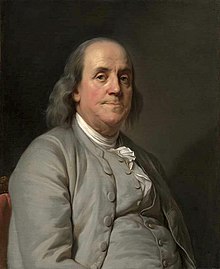|
|
 The American Connection
Benjamin Franklin
1706 - 1790
 If any name inspires a sense of national pride in Americans it must be that of Benjamin Franklin. For not only was Franklin an outstanding ambassador who fought fearlessly for the rights of colonists in the New World, he was also a great statesman who helped formulate the terms of government following independence. If any name inspires a sense of national pride in Americans it must be that of Benjamin Franklin. For not only was Franklin an outstanding ambassador who fought fearlessly for the rights of colonists in the New World, he was also a great statesman who helped formulate the terms of government following independence.
Scientist, diplomat, philosopher, author, Franklin possessed a rare intellect and an astonishing range of skills. Yet he was a man of simple tastes and self-effacing manner whose natural charm and out-spoken honesty won him respect and affection at every social level.
Born in Boston on January 17, 1706, Franklin was the fifteenth of seventeen children. The family was poor and Franklin had little more than a year's formal schooling before being put into his father's business of candlemaking at the age of ten. He did not take to the work and two years later he was apprenticed to his brother James, a printer.
Franklin flourished in this environment and he even taught himself to write news articles so that he could make anonymous contributions to his brother's paper. When this was discovered, the brothers fell out and Franklin had to find work elsewhere.
After an unsuccessful attempt in New York, Franklin made his way to Philadelphia arriving in October 1723. There he quickly made a name for himself but he lacked the experience and financial backing to set up on his own. The provincial governor of Pennsylvania, Sir William Keith, who had by then become a friend told Franklin to sail for London where he could finish his training and buy the equipment he needed to start his own business. He took the advice but the letters of introduction and credit that Keith had promised failed to arrive.
Alone, out of work and with no-one to speak for him, Franklin might have faced a bleak future but with typical determination he soon found himself jobs at two of the leading printing houses in the city. His personal qualities were so obvious and impressive that within two years, he had gained the recognition of a number of important people in literature and publishing.
The ability to win influence at the centres of power was a gift that served Franklin well all his life. While he remained unaffected, he knew how to use it to the benefit of his country when he eventually retired from printing and went into politics. Abroad, he championed the cause of American autonomy, at home, he argued for one nation through united states. In this, as in so many other areas, he had the vision to invent and explore new concepts when others opposed change.
Breaking boundaries was Franklin's passion in everything. Building on the most basic education, he became a distinguished scientist, philosopher and writer. From small beginnings in the print trade, he became an established publisher. As an envoy he commanded the attention of kings and counsellors. As a public servant he won the esteem of statesmen and citizens alike.
An extraordinary man by any standards, Benjamin Franklin nevertheless regarded himself as unexceptional. And although his humility was sincere, he certainly did not lack humour. With a special knack for good sense with a sting, he coined phrases such as: 'Nothing is inevitable but death and taxes' and 'Love your neighbour - yet don't pull down your hedge.'
This blend of perception and wit was characteristic of Franklin and he applied it to everything, including his own mortality. For his epitaph he wrote:
"The Body of B. Franklin, Printer, Like the Cover of an old Book, its Contents torn out, and stript of its Lettering and Gilding, lies here, Food for Worms. But the work shall not be wholly lost: for it will, as he believed, appear once more, in a new and more perfect Edition, corrected & amended by the Author."

Benjamin Franklin image courtesy of Wikipedia
Copyright © Jan Collie 2002
Published by permission of the author.
All rights reserved. No reproduction, copy or transmission of this publication may be made without written permission.
| |
|